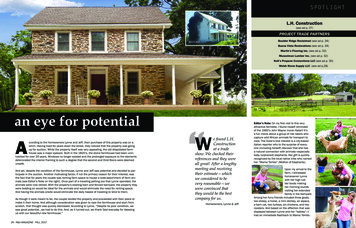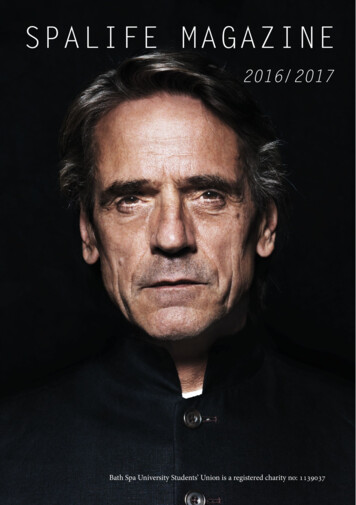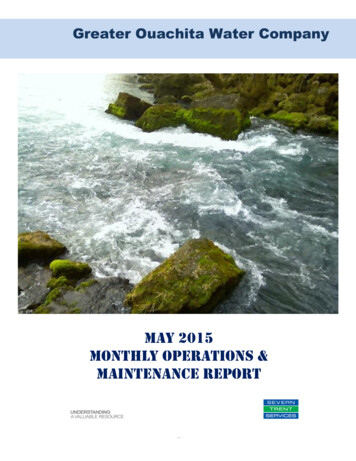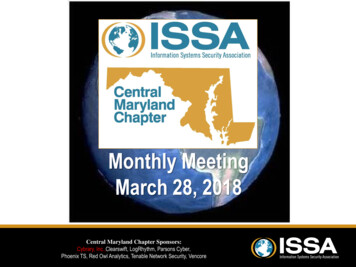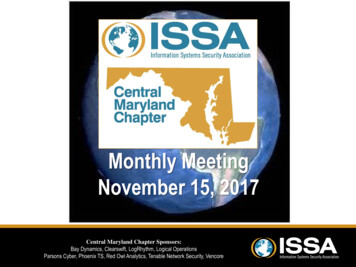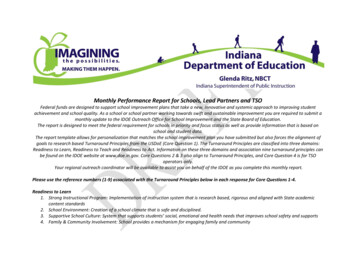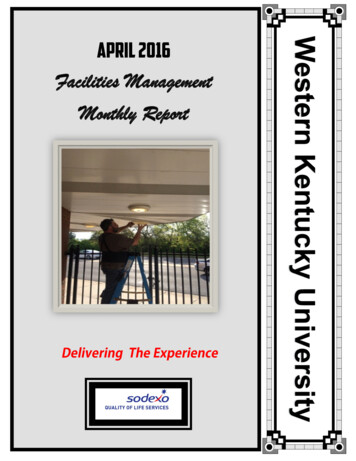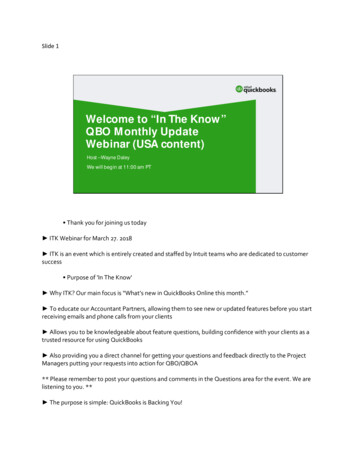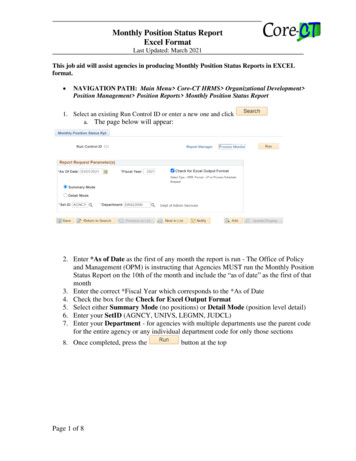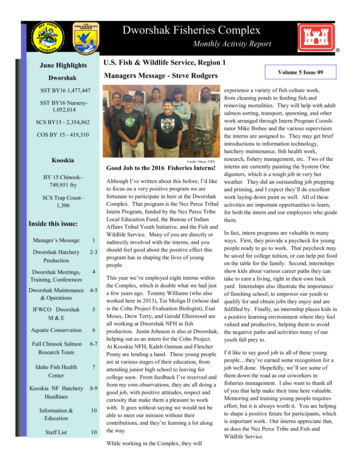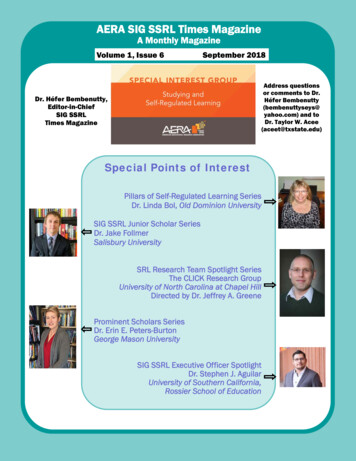
Transcription
AERA SIG SSRL Times MagazineA Monthly MagazineVolume 1, Issue 6September 2018Address questionsor comments to Dr.Héfer Bembenutty(bembenuttyseys@yahoo.com) and toDr. Taylor W. Acee(aceet@txstate.edu)Dr. Héfer Bembenutty,Editor-in-ChiefSIG SSRLTimes MagazineSpecial Points of InterestPillars of Self-Regulated Learning SeriesDr. Linda Bol, Old Dominion UniversitySIG SSRL Junior Scholar SeriesDr. Jake FollmerSalisbury UniversitySRL Research Team Spotlight SeriesThe CLICK Research GroupUniversity of North Carolina at Chapel HillDirected by Dr. Jeffrey A. GreeneProminent Scholars SeriesDr. Erin E. Peters-BurtonGeorge Mason UniversitySIG SSRL Executive Officer SpotlightDr. Stephen J. AguilarUniversity of Southern California,Rossier School of Education
Page 2AERA SIG SSRL Times MagazineNominations Are Open for SIG Officers ElectionDeadline: September 20, 2018Our SIG needs you!Our SIG elects four new junior officers each year:1. The junior SIG chair, who collaborates with the senior SIG chair on the general administration ofthe SIG;2. The junior SIG Program Chair, who works with the senior SIG Program Chair to organize thereview of proposals and the creation of the SIG program for the annual meeting of the AERA;3. The junior SIG secretary/newsletter editor, who collaborates with the senior SIG secretary/newsletter editor on the creation of newsletters, and on writing up the minutes from ourbusiness meeting; and4. The junior SIG treasurer/membership, who collaborates with the senior SIG treasurer/membership and who requests funds from AERA and reports on the SIG’s membership andfinancial status during our business meeting at the annual meeting.Each term of office is two years: the first year as junior and the second year as senior. In ourexperience, each office involves a manageable amount of work while at the same time providingenriching professional experiences such as networking with colleagues in our field.We hope you will consider volunteering or, with their permission, nominating colleagues, byemailing Dr. Héfer Bembenutty (bembenuttyseys@yahoo.com) or Dr. Taylor Acee(aceet@txstate.edu) by September 20, 2018.Participate in Our Facebook Group & Visit Our Website!Participate in our Facebook group! Join our Studying & Self-Regulated Learning SIGFacebook group! This group is meant for SIG members to share their work, posequestions, post announcements, and celebrate successes. Through sharing, we getto know each other and can form a strong network of researchers studying the manydimensions of self-regulated learning. To make our group a success, we need yourhelp posting content. The more we hear from members, the more interesting andinteractive this group will be. Examples of posts you can make are: questions andpolls, announcements, photos/video, links to your publications, and links to otherarticles you find interesting. If you have any questions regarding this group, pleasemessage our group administrator, Charles Raffaele (craffaele@gradcenter.cuny.edu).We are looking forward to reading what you have to share!Join us on Facebook: https://www.facebook.com/groups/AERASSRL/VISIT OUR WEBSITE: https://ssrlsig.org/
Page 3AERA SIG SSRL Times MagazinePillars of Self-Regulated Learning SeriesDr. Linda BolOld Dominion UniversityDr. Linda Bol is a Professor in Educational Foundations and Leadership at Old Dominion University with aprogram emphasis in educational psychology and program evaluation. Dr. Bol obtained her doctorate from theUniversity of California, Berkeley in educational psychology, and currently teaches graduate courses in theories oflearning, self-regulation and metacognition, research methods, program evaluation, formative assessment, anddissertation seminar.Dr. Bol maintains an active research agenda in self-regulated learning in classroom settings. One area ofspecialization centers on students’ calibration accuracy and strategies employed to improve the accuracy of thesemetacognitive judgments. Specifically, Dr. Bol examines students’ ability to predict their test performance withinterventions aimed at improving the accuracy of these predictions.Dr. Bol has conducted numerous evaluation studies of educational programs aimed at promoting achievementof at-risk youth. She has also published studies on teachers’ assessment practices in an era of high-stakes testing andthe cognitive demand associated with these practices. Recently, she served as a Co-Principal Investigator evaluating a 26 million dollar Investing in Innovation (i-3) grant focused on improving the mathematics achievement of middleschool students. She has received grants for and conducted evaluation research on programs that include teachingAmerican history grants, smaller learning communities, and charter schools.Dr. Bol’s students have received awards, including the Outstanding Graduate Research Award from Studyingand Self-Regulated Learning SIG, American Educational Research Association, and she received the Graduate TeachingAward, College of Education, Old Dominion University (2017). Her recent publications include a book chapterCalibration and Self-Regulated Learning: Making the Connections, and articles Can Providing Rubrics for Writing TasksImprove Developing Writers’ Calibration Accuracy? and Improving Metacomprehension and Calibration Accuracy inDigital Text Using Prompts.Testimonial“I have enjoyed taking courses with Dr. Bol for the last two years. Her feedback and mentorship have been aninvaluable asset to me while working toward my Ph.D. in Education at Old Dominion University. I look forward to workingmore closely with her over the remainder of my time at ODU.” – Wanda BrooksContinued on next page
Page 4AERA SIG SSRL Times MagazinePillars of Self-Regulated Learning SeriesDr. Linda BolPh.D. in Educational Psychology, University of California, Berkeley, (1991)M.A. in General/Experimental Psychology, California State University, Fresno, (1985)B.A. in Psychology, California State University, Fresno, (1982) 2012: Largest Grant Award, Darden College of Education2012: Most Collaborative Grant Award, Darden College of Education2011: Doctoral Mentoring Award, Old Dominion University2009: Shining Star, Old Dominion University2009: Finalist for Doctoral Mentoring Award, Old Dominion University2008: Finalist for Doctoral Mentoring Award, Old Dominion University2004: Tonelson Award for Outstanding Faculty Member in Research, Teaching, and Service, Darden College2000: Department Scholarship Award, Education Curriculum and Instruction, Old Dominion University1996: Outstanding Teacher Education Award for Research , University of Memphis1992: Outstanding Doctoral Dissertation Award, Graduate School of Education, University of CaliforniaAbstractsBol, L., Campbell, K. D., Perez, T., & Yen, C. J. (2016). The effects of self-regulated learning training on communitycollege students’ metacognition and achievement in developmental math courses. Community College Journal ofResearch and Practice, 40(6), 480-495.The effects of training in self-regulation on metacognition and math achievement were investigated. The participants were 116 community college students enrolled in developmental math courses. Students enrolled in 16classrooms were randomly assigned to the treatment and control groups. Participants in the treatment group completed four self-regulated learning (SRL) exercises based on Zimmerman’s (2002) cyclical model. The exerciseswere completed weekly and repeated for a total of 3 weeks. During the last week of class, participants completed afinal exam to measure math achievement as well as the metacognitive self-regulation and time/study environmentmanagement scales on the Motivated Strategies for Learning Questionnaire ([MSLQ], Pintrich, Smith, Garcia, &McKeachie, 1991). There were significant differences between the two groups, indicating that training in SRL improved math achievement and metacognitive skills assessed on both MSLQ scales. The findings suggested thattraining in SRL improves math achievement, metacognitive self-regulation and time/study environmental management skills of students enrolled in developmental math courses.Bol, L., & Strage, A. (1996). The contradiction between teachers' instructional goals and their assessment practicesin high school biology courses. Science Education, 80(2), 145-163.This study examines the correspondence between (1) teachers' student learning outcome goals, and (2) teachers'assessment practices. Ten high school biology teachers were interviewed individually about their teaching philosophies and practices. Teachers' student learning goals were categorized, and their test and practice items were ratedon level of processing (whether the item required basic knowledge, integration, or application) and item format(recognition or recall). Overall, teachers wanted their students to develop a general interest in and understanding ofbiology as well as its real-world applications. They also wanted their students to develop higher order study skills byinterpreting information, managing their time and effort, and thinking critically. However, their assessment practicesdid not support these goals. On average, over half of the items (52% of test items, 53% of practice items) requiredonly basic knowledge, while almost none required application (5% of test items, 4% of practice items). Nearly twothirds (65%) of test items were recognition items. Interview findings suggest that teachers were not aware of thecontradiction between their instructional goals and assessment practices.Continued on next page
Page 5AERA SIG SSRL Times MagazinePillars of Self-Regulated Learning SeriesAn Interview with Dr. Linda Bol: A Founding Member of the Studying and SelfRegulated SIG and a Leading Force in Calibration Accuracy and PerformanceBy Mr. Andre HayesHayes: How did you develop your interest in self-regulated learning?Bol: When in my doctoral program, I was a graduate assistant for a large program entitled theAutonomous Learning Project. The focus was on academic studying and incorporated selfregulated learning strategies. The project and subject matter were fascinating and had clearimplications for improving students’ self-regulation and achievement. My mentors, WilliamRohwer and John Thomas, not only introduced me to this topic but modeled how to conductsound research in ecologically valid contexts. I decided to use some of the project data for mydissertation and with my mentors’ support went on to establish a research agenda in SRL andcalibration. Calibration is how accurately an individual’s metacognitive judgments about herperformance corresponds to her actual performance. My collaborator in this line of research isDouglas Hacker, who also sets a high bar for the quality of our work. He may be too wellcalibrated.Hayes: Please describe the research you are doing in the area of self-regulated learning,Bol: Given my doctoral research, it should not be surprising that a common theme in my research is conducting studies in realworld classrooms using authentic tasks. My colleagues, students, and I are currently conducting three SRL studies in classroomsettings. In the first, we investigate how metacognitive judgements in groups with guidelines affects calibration accuracy andachievement among high school students enrolled in history courses. This is a partial replication of a previous study in which weexamined these treatments in high school biology courses. We found that guidelines in group settings improved calibrationaccuracy and performance. The second study is also a partial replication of research conducted with developmental mathstudents enrolled in a community college. Our findings showed that an SRL intervention (e.g., goal-setting, time management,monitoring and reflection) improved self-regulation and achievement. We are now examining a similar intervention aimed atcommunity college students enrolled in the earth sciences. In the third project, we are studying how the use of graphics to depictand measure mathematical problem-solving influences calibration accuracy and achievement among high school students. Weare in the initial stages of our research but hope to submit at least two proposals to our SIG this summer. Stay tuned!Hayes: How does SRL influence your teaching?Bol: I incorporate both explicit and implicit SRL strategies in my teaching. In terms of explicit strategies, I directly inform mystudents about SRL theory and research highlighting effective strategies. We then discuss how they could be incorporated intopreparing for class assignments. I provide a lot of scaffolding to prompt SRL processes such as group work that entailscomprehension monitoring, self-testing, and reflection. A final way in which SRL influences my teaching is when I model SRLstrategies by verbalizing how to work through problems and monitor content mastery.Hayes: As a founding member of the SIG, please tell me about its origins, name, original members, and its development.Bol: When I was a doctoral student, I had the distinct honor of being an original member of the SSRL SIG. I began studyingSRL when working on the Autonomous Learning Project (ALPS) that focused on academic studying. The principal investigatorsof ALPS, Rohwer and Thomas, were the founding members of this SIG. The SIG was originally named Academic Studying. Abit later, Dr. Barry Zimmerman, also a founding member, encouraged more emphasis on self-regulated learning in order toincrease membership and interest. Such a shocking proposition given the source. This is why our SIG is now named Studyingand Self-Regulated Learning. I remember our first business meeting was held at Far West Labs where the grant was housedbecause AERA was in San Francisco that year. There were about a dozen of us sitting around a conference table, including myfellow GA or “study buddy” as his son called us. We said little but listened intently. Robert and I went on to serve as co-officers afe
AERA SIG SSRL Times Magazine 2012: Largest Grant Award, Darden College of Education 2012: Most Collaborative Grant Award, Darden College of Education 2011: Doctoral Mentoring Award, Old Dominion University 2009: Shining Star, Old Dominion University 2009: Finalist for Doctoral Mentoring Award, Old Dominion University


